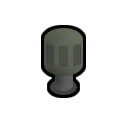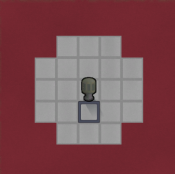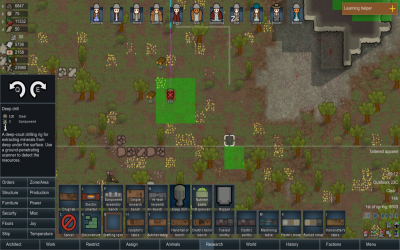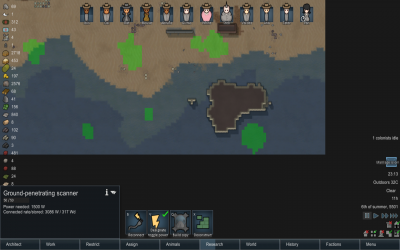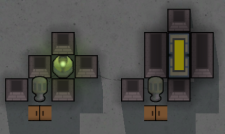Difference between revisions of "Deep drill"
m |
|||
| (68 intermediate revisions by 13 users not shown) | |||
| Line 1: | Line 1: | ||
| − | {{ | + | {{Infobox main|production |
| − | + | | name = Deep drill | |
| − | |name = Deep drill | + | | image = Deep drill.png |
| − | |image = Deep drill.png | + | | description = A deep-crust drilling rig for extracting minerals from deep under the surface. Use a ground-penetrating scanner to detect the resources. This drill will yield stone chunks if no resources are present. Can be repositioned freely. |
| − | + | | type = Building | |
| − | |description = A deep-crust drilling rig for extracting minerals from deep under the surface. Use a ground-penetrating scanner to detect the resources. This drill will yield stone chunks if no resources are present. Can be repositioned freely. | + | | type2 = Production |
| − | |type = Building | + | | placeable = true |
| − | |type2 = Production | + | | path cost = 50 |
| − | |placeable = true | + | | passability = pass through only |
| − | |path cost = 50 | + | | cover = 0.5 |
| − | |passability = pass through only | + | | minifiable = true |
| − | |cover = 0.5 | + | | size = 1 ˣ 1 |
| − | |minifiable = true | + | | mass base = 35 |
| − | |size = 1 ˣ 1 | + | | flammability = 0.5 |
| − | |mass base = 35 | + | | hp = 300 |
| − | |flammability = 0.5 | + | | sell price multiplier = 0.7 |
| − | |hp = 300 | + | | beauty = -25 |
| − | |sell price multiplier = 0.7 | + | | power = -200 |
| − | |beauty = -25 | + | | terrain affordance = light |
| − | |power = -200 | + | | research = Deep drilling |
| − | |terrain affordance = light | + | | skill 1 = Construction |
| − | |research = Deep drilling | + | | skill 1 level = 4 |
| − | |skill 1 = Construction | + | | work to make = 10000 |
| − | |skill 1 level = 4 | + | | resource 1 = Steel |
| − | |work to make = 10000 | + | | resource 1 amount = 100 |
| − | |resource 1 = Steel | + | | resource 2 = Component |
| − | |resource 1 amount = 100 | + | | resource 2 amount = 2 |
| − | |resource 2 = Component | ||
| − | |resource 2 amount = 2 | ||
}} | }} | ||
| − | {{Info|A '''deep drill''' extracts resources, such as [[ | + | {{Info|A '''deep drill''' extracts resources, such as [[metals]] or [[stone chunk]]s, from underground deposits.}} |
| − | == | + | == Acquisition == |
| − | + | {{Stub|section=1|reason=Are they ever found in [[work site|mining camps]] like the scanners?}} | |
| + | {{Acquisition}} | ||
| − | + | == Summary == | |
| + | [[File:Deepdrill radius.png|thumb|175px|left|White tile highlights the drill's mining radius.]] | ||
| + | A deep drill takes 200 W of [[power]] and occupies a 1x2 cell space, 1 for the drill and 1 for the interaction spot. Deep drills can be uninstalled freely. | ||
| − | A drill | + | A deep drill can mine ore deposits found by the [[ground-penetrating scanner]], with the mined ore placed in a tile adjacent to the drill at the end of each extraction cycle. Deep drills will mine ore deposits in a 2.6-tile radius, or 5-tile diameter. While drills can't be placed in water,{{Check Tag|Bridges?|Can you build drills on bridges to mine waterlogged deposits?}} walls, or other invalid terrain, a nearby drill can still mine ores within those tiles. |
| − | + | Drills being worked without a deposit in their radius instead produce [[stone chunk]]s from the map's available stone types. Drills placed on ice, predominantly found in the [[ice sheet]] and [[sea ice]] [[biome]]s, will not produce stone chunks, though ore deposits on ice ''can'' be scanned, accessed, and mined as usual. | |
| − | |||
| − | |||
| − | |||
| − | + | Operation requires a pawn capable of [[mining]]. Each extraction cycle requires {{Ticks|14000}} of work to finish, modified by the colonist's [[Deep Drilling Speed]] stat, and unaffected by the resource type being mined. Unlike at most production stations, pawns using a deep drill will not sit and gain comfort from a chair positioned at their working spot. [[Tunneler]] mechanoids{{BiotechIcon}} are unable to use a deep drill. | |
| − | A | + | === Ores === |
| + | A [[ground-penetrating scanner]] can be used to create ore deposits. | ||
| − | + | {{Deep Ore Deposit Table}} | |
| − | + | The drill's inspection pane shows what resource is below ({{lc:{{#ask:[[Category:Metal]] AND [[Name::!Bioferrite]]}}, or [[jade]]}}). Cells will turn from green to yellow and then blank as they are depleted. Each cell contains a total of 300 resources, but the actual quantity obtained might be more or less than that, since it is multiplied by the miner's [[mining yield]]. When the drill runs out of ores, it is automatically forbidden, though you can unforbid it to mine stone chunks as usual. | |
| − | + | <gallery widths="400px" heights="400px" class="left" mode="nolines"> | |
| + | File:Unreachable deposit.png|'''Minerals on the map border can be extracted''' | ||
| + | File:Minerals found in deep waters.png|'''Minerals detected past the coastline cannot be extracted''' | ||
| + | </gallery> | ||
| − | + | === Infestations === | |
| − | . | + | {{Stub|section=1|reason=Details - How often does this happen, how many insects appear, etc. Initial investigation from CompCreatesInfestations but needs to be tested in game - Can't fire again with 7 days of a deep drill infestation from that drill, or any drill within 10 tiles. No idea about the MTB infestations though}} |
| − | + | Manned drills are capable of drilling into underground [[insectoid]] hives, activating the [[Events/Incidental#Too Deep: Infestation|Too Deep: Infestation]] event and bringing several insectoids to the surface. There will be a short delay between the alert and their appearance, giving your miner time to get away. | |
| − | + | == Analysis == | |
| + | When combined with [[ground-penetrating scanner]]s, deep drills are a vast and valuable source of metals. These minerals often limit a colony when it comes to [[ship]] building or general advancement. A ground-penetrating scanner can find an infinite amount of veins over time, meaning you don't have to leave your colony or rely on [[trade]] to get them. Due to how slow drilling is, you may want to place multiple drills when mining for ore deposits. | ||
| − | + | As the colonist will often spend long times drilling in a place far away from the base, their [[Mood]] will suffer because of the lack of [[beauty]] and [[comfort]]. A room can be constructed around the drill to mitigate the debuffs, using [[sculpture]]s to increase room quality. | |
| − | == | + | === Power === |
| − | + | [[File:Drill-defense.png|thumb|225px|right|Defend your drill & power with walls.<br>Left: [[Unstable power cell]] Right: [[Battery]]]] | |
| + | A deep drill requires [[power]] to operate, but ore deposits may be far from your main power grid. A [[vanometric power cell]] can power up to 5 drills with no input required. Although it is quite explosive, an [[unstable power cell]] {{RoyaltyIcon}} is easier to get, and can power 2 drills. A fully charged [[battery]] can be re-installed near the drill, providing a little less than 3 days worth of power at a time. | ||
| − | + | === Comparison to long-range scanners === | |
| − | + | The [[long-range mineral scanner]] can find readily mineable ores on the world map, as opposed to ores that need to be drilled. | |
| − | |||
| − | |||
| − | |||
| − | |||
| − | |||
| − | |||
| − | |||
| − | |||
| − | |||
| − | |||
| − | |||
| − | + | Compared to drilling, it is much faster, but more difficult, to mine ores with a long-range scanner. At 100% [[Mining Speed]] (Mining 8), a pawn requires {{Ticks|47.5}} per steel just to mine the ore, while deep drilling requires {{Ticks|400}} per steel just for extraction. While the long-range scanner finds ore roughly {{Ticks/gametime|60000}} slower, you can search for a specific ore like plasteel or gold. It is possible for the ground scanner to find ore at the edges of the map, forcing massive travel times and making the ore deposit impractical. When mining for steel, the travel time can in theory be ignored if transport-pods are used to transport the materials, although this comes at a cost of losing about 20-25% of the steel to transport costs. | |
| − | |||
| − | |||
| − | |||
| − | |||
| − | |||
| − | |||
| − | |||
| − | |||
| − | |||
| − | |||
| − | |||
| − | |||
| − | |||
| − | |||
| − | |||
| − | |||
| − | |||
| − | |||
| − | |||
| − | |||
| − | |||
| − | |||
| − | |||
| − | |||
| − | |||
| − | + | The benefit of deep drilling is ease of use. Ground-penetrating scanners find much more ore (9000 vs 2300 [[steel]]) per deposit. Deep drilling allows your miners to stay within your colony. In contrast, the long-range scanner forces you travel to the destination, fight ambushes, and bring oft-heavy ores back. While drilling is slow, you can have multiple miners operate multiple deep drills. The bottleneck with ground-penetrating scanners, most often, are miners. The bottleneck with long-range scanners is often the scanning and travel time; 1 good miner is sufficient to mine a single ore scan. | |
| − | + | So, overall, drilling operations are a way for lategame and endgame colonies to accumulate resources. Long-range scanners are better if you need large amounts of a specific ore quickly, but is more difficult to organize. Also, which option to prefer can depend on quantity and quality of miners. Long-range scanners are relatively better when you only have 1 good miner. | |
== Version history == | == Version history == | ||
* Beta 19 - [[Chemfuel]] can no longer be acquired by drilling. | * Beta 19 - [[Chemfuel]] can no longer be acquired by drilling. | ||
* Beta 19/ 1.0 - Now costs more and mines slower. | * Beta 19/ 1.0 - Now costs more and mines slower. | ||
| − | * 1.0 - | + | * 1.0 - It is now possible to drill into insectoid hives. |
| − | * [[Version/1.1.2624|1.1.2624]] - | + | * [[Version/1.1.2624|1.1.2624]] - The area of deep drills has been expanded to become 21 tiles large (5x5 square minus the corners), as opposed to 9 tiles (3x3 square). Its power consumption has also been reduced (300 -> 200W). |
| − | + | * [[Version/1.3.3067|1.3.3067]] - Fix: Deep drills produce chunks over themselves and their interaction cells. | |
| + | * [[Version/1.4.3523|1.4.3523]] - Fix: Deep drilling job not canceling when forbidden or exhausted the resource. | ||
| − | {{ | + | {{Nav|production|wide}} |
[[Category:Production]] [[Category:Resource Production]] | [[Category:Production]] [[Category:Resource Production]] | ||
Latest revision as of 05:37, 5 August 2024
Deep drill
A deep-crust drilling rig for extracting minerals from deep under the surface. Use a ground-penetrating scanner to detect the resources. This drill will yield stone chunks if no resources are present. Can be repositioned freely.
Base Stats
- Type
- Building – Production
- Mass
- 35 kg
- Beauty
- -25
- HP
- 300
- Flammability
- 50%
- Path Cost
- 50 (21%)
Building
- Size
- 1 × 1
- Minifiable
- True
- Placeable
- True
- Passability
- pass through only
- Cover Effectiveness
- 50%
- Terrain Affordance
- Light
- Power
- -200 W
Creation
- Required Research
- Deep drilling
- Skill Required
- Construction 4
- Work To Make
- 10,000 ticks (2.78 mins)
A deep drill extracts resources, such as metals or stone chunks, from underground deposits.
Acquisition[edit]
| This section is a stub. You can help RimWorld Wiki by expanding it. Reason: Are they ever found in mining camps like the scanners?. |
Deep drills can be constructed once the deep drilling research project has been completed. Each requires ![]() 100 Steel,
100 Steel, ![]() 2 Components, 10,000 ticks (2.78 mins) of work modified by the construction speed of the builder, and a construction skill of 4.
2 Components, 10,000 ticks (2.78 mins) of work modified by the construction speed of the builder, and a construction skill of 4.
Summary[edit]
A deep drill takes 200 W of power and occupies a 1x2 cell space, 1 for the drill and 1 for the interaction spot. Deep drills can be uninstalled freely.
A deep drill can mine ore deposits found by the ground-penetrating scanner, with the mined ore placed in a tile adjacent to the drill at the end of each extraction cycle. Deep drills will mine ore deposits in a 2.6-tile radius, or 5-tile diameter. While drills can't be placed in water,[Bridges?] walls, or other invalid terrain, a nearby drill can still mine ores within those tiles.
Drills being worked without a deposit in their radius instead produce stone chunks from the map's available stone types. Drills placed on ice, predominantly found in the ice sheet and sea ice biomes, will not produce stone chunks, though ore deposits on ice can be scanned, accessed, and mined as usual.
Operation requires a pawn capable of mining. Each extraction cycle requires 14,000 ticks (3.89 mins) of work to finish, modified by the colonist's Deep Drilling Speed stat, and unaffected by the resource type being mined. Unlike at most production stations, pawns using a deep drill will not sit and gain comfort from a chair positioned at their working spot. Tunneler mechanoids![]() are unable to use a deep drill.
are unable to use a deep drill.
Ores[edit]
A ground-penetrating scanner can be used to create ore deposits.
| Resource | Deposit size | Deposit mean | Commonality | Portion size | Avg Deposit Return |
|---|---|---|---|---|---|
| 20 - 40 | ~ 30 | 4 | 45 | 9000 | |
| 7 - 20 | ~ 14 | 0.5 | 40 | 4200 | |
| 2 - 10 | ~ 7 | 1 | 10 | 2100 | |
| 1 - 5 | ~ 3 | 0.5 | 10 | 900 | |
| 1 - 5 | ~ 3 | 0.5 | 10 | 900 | |
| 4 - 10 | ~ 7 | 1 | 10 | 2100 |
The drill's inspection pane shows what resource is below (gold, plasteel, silver, steel, uranium, or jade). Cells will turn from green to yellow and then blank as they are depleted. Each cell contains a total of 300 resources, but the actual quantity obtained might be more or less than that, since it is multiplied by the miner's mining yield. When the drill runs out of ores, it is automatically forbidden, though you can unforbid it to mine stone chunks as usual.
Infestations[edit]
| This section is a stub. You can help RimWorld Wiki by expanding it. Reason: Details - How often does this happen, how many insects appear, etc. Initial investigation from CompCreatesInfestations but needs to be tested in game - Can't fire again with 7 days of a deep drill infestation from that drill, or any drill within 10 tiles. No idea about the MTB infestations though. |
Manned drills are capable of drilling into underground insectoid hives, activating the Too Deep: Infestation event and bringing several insectoids to the surface. There will be a short delay between the alert and their appearance, giving your miner time to get away.
Analysis[edit]
When combined with ground-penetrating scanners, deep drills are a vast and valuable source of metals. These minerals often limit a colony when it comes to ship building or general advancement. A ground-penetrating scanner can find an infinite amount of veins over time, meaning you don't have to leave your colony or rely on trade to get them. Due to how slow drilling is, you may want to place multiple drills when mining for ore deposits.
As the colonist will often spend long times drilling in a place far away from the base, their Mood will suffer because of the lack of beauty and comfort. A room can be constructed around the drill to mitigate the debuffs, using sculptures to increase room quality.
Power[edit]
A deep drill requires power to operate, but ore deposits may be far from your main power grid. A vanometric power cell can power up to 5 drills with no input required. Although it is quite explosive, an unstable power cell ![]() is easier to get, and can power 2 drills. A fully charged battery can be re-installed near the drill, providing a little less than 3 days worth of power at a time.
is easier to get, and can power 2 drills. A fully charged battery can be re-installed near the drill, providing a little less than 3 days worth of power at a time.
Comparison to long-range scanners[edit]
The long-range mineral scanner can find readily mineable ores on the world map, as opposed to ores that need to be drilled.
Compared to drilling, it is much faster, but more difficult, to mine ores with a long-range scanner. At 100% Mining Speed (Mining 8), a pawn requires 47.5 ticks (0.79 secs) per steel just to mine the ore, while deep drilling requires 400 ticks (6.67 secs) per steel just for extraction. While the long-range scanner finds ore roughly 60,000 ticks (24 in-game hours) slower, you can search for a specific ore like plasteel or gold. It is possible for the ground scanner to find ore at the edges of the map, forcing massive travel times and making the ore deposit impractical. When mining for steel, the travel time can in theory be ignored if transport-pods are used to transport the materials, although this comes at a cost of losing about 20-25% of the steel to transport costs.
The benefit of deep drilling is ease of use. Ground-penetrating scanners find much more ore (9000 vs 2300 steel) per deposit. Deep drilling allows your miners to stay within your colony. In contrast, the long-range scanner forces you travel to the destination, fight ambushes, and bring oft-heavy ores back. While drilling is slow, you can have multiple miners operate multiple deep drills. The bottleneck with ground-penetrating scanners, most often, are miners. The bottleneck with long-range scanners is often the scanning and travel time; 1 good miner is sufficient to mine a single ore scan.
So, overall, drilling operations are a way for lategame and endgame colonies to accumulate resources. Long-range scanners are better if you need large amounts of a specific ore quickly, but is more difficult to organize. Also, which option to prefer can depend on quantity and quality of miners. Long-range scanners are relatively better when you only have 1 good miner.
Version history[edit]
- Beta 19 - Chemfuel can no longer be acquired by drilling.
- Beta 19/ 1.0 - Now costs more and mines slower.
- 1.0 - It is now possible to drill into insectoid hives.
- 1.1.2624 - The area of deep drills has been expanded to become 21 tiles large (5x5 square minus the corners), as opposed to 9 tiles (3x3 square). Its power consumption has also been reduced (300 -> 200W).
- 1.3.3067 - Fix: Deep drills produce chunks over themselves and their interaction cells.
- 1.4.3523 - Fix: Deep drilling job not canceling when forbidden or exhausted the resource.
